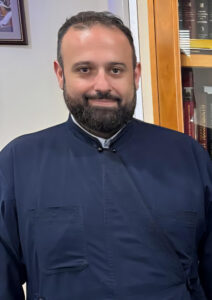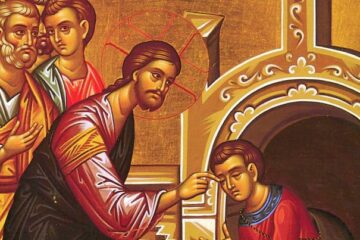By Fr. Michael Psaromatis
Greek Orthodox Archdiocese of Australia
What if your worth had nothing to do with your performance?
What if, before you ever succeeded or failed, you were already loved?
These are not slogans from a self-help book, but the quiet, firm truth proclaimed by the Church, day after day, century after century.
In a world increasingly marked by fragmentation and pressure to perform, many young people struggle to understand their identity and self-worth. Social media offers a carefully edited version of life that encourages constant comparison, while academic, professional, and even social environments impose unrealistic expectations. The message repeated in countless ways is this: strive harder, achieve more, be impressive. Even within religious circles, the temptation exists to treat faith as another area in which to prove one’s value rather than to receive healing.
The Orthodox Church speaks with a voice that challenges this mindset. She does not say, “Perform in order to be accepted.” Instead, she proclaims, “You are already loved. Come and be healed.” The centre of Orthodox life is communion, not competition. It is not built on self-promotion, but on self-offering. The Orthodox Church is always ever present to respond to the silent burdens many young people carry, particularly the pressures of perfectionism, the pain of anxiety, and the confusion of distorted relationships. Drawing on Scripture, the Church Fathers, and the sacramental life of the Church, it offers an invitation not to strive for perfection but to be transfigured by grace.
Sometimes in church, I notice younger people sitting quietly at the back. Their shoulders are tense, and their faces appear drawn. They believe they have failed in school, in friendships, and even in their faith. They feel lost in prayer and uncertain about how to approach confession. An inner voice tells them, “You are not good enough. You will never get it right.” But the Church is not there to judge or measure them. It waits with open arms. And Christ does not ask for perfection. He simply asks, “Do you want to be made well?”
The drive for perfection can quickly become an invisible prison. People internalise messages such as “I must never fail,” or “I must always be liked,” or “I must never appear weak.” Yet this way of thinking is foreign to the lives of the saints and to the healing approach of Christ. In the Gospel of John, we encounter the paralysed man at the Pool of Bethesda (John 5:1–15). He had no strength, no plan, and no social advantage. Yet Christ approaches him not with a demand for qualifications, but with a question of compassion. His healing is not earned through effort but received as a gift.
This is not the result of performance but is given freely to those in need. Saint Isaac the Syrian reminds us of the mercy of God when he writes, “Do not call God just, for His justice is not seen in the things concerning you. If David calls Him just and righteous, His Son has revealed to us that He is good and kind. He is kind to the ungrateful and the wicked” (Ascetical Homilies). The justice of God is not limited to retribution but is revealed in love that restores and transforms. The Christian life is not a pass or fail examination. It is the story of a wound being healed. True Christian perfection is not the absence of mistakes, but the presence of humility and trust in God’s mercy.
Saint Silouan of Mount Athos speaks directly to the heart of those who suffer in silence. He teaches, “Keep your mind in hell and despair not” (Writings). This is not a call to hopelessness. Rather, it is an invitation to radical humility. It recognises the depth of our brokenness while clinging firmly to the limitless mercy of Christ.
In the quest for identity, many today, especially young people, find themselves burdened with anxiety and fear. Beneath the surface, there are quiet but persistent questions: Who am I if I fail? What if I am not attractive, gifted, or impressive enough? Am I still worthy of love if I fall short? These questions reflect a cultural message that meaning must come entirely from within. You must define yourself, prove yourself, and constantly live up to an ideal. This mindset often leads to deep insecurity, as self-worth becomes dependent on external success or the approval of others. The pressure to project an image of control, beauty, or achievement can leave a person feeling shattered and unseen. In Orthodox Christianity, identity is not invented by the self. It is revealed by God.
In the fourth chapter of John’s Gospel, Jesus meets the Samaritan woman at the well. She is burdened with shame and isolation. Yet Christ sees her, speaks to her, and honours her dignity. He brings her hidden thirst to the surface and offers her living water. He does not judge her; He restores her.
Saint Gregory Palamas explains that “God created man in His image, and the fullness of the image is Christ… the true image of the Father” (Homily on the Transfiguration). Our identity does not come from our accomplishments or our reputation. It is rooted in the fact that we are made in the image of God. This image is fulfilled and renewed as we grow in the likeness of Christ. The Orthodox tradition calls this journey theosis. It is the path of becoming by grace what Christ is by nature. This is not a solitary effort. It takes place in communion with the Church and with others.
The Orthodox vision stands in stark contrast to the world’s view. The world says, “You are what you do.” The Church says, “You are beloved of God, created for communion, love, and transformation.” Saint Porphyrios of Kavsokalyvia offers gentle guidance to those caught in self-condemnation: “Do not struggle to remove the darkness from the room. Simply open the window and let in the light” (Wounded by Love). Identity is not achieved by obsessively fixing what is wrong, but by allowing the light of Christ to enter the heart and reveal who we are.
Our culture often treats relationships as transactions. They are entered into with unspoken expectations: to gain affirmation, to soothe loneliness, to escape discomfort, or to feel powerful. In such an atmosphere, relationships are not built on the mystery of personhood, but on the exchange of benefits. The other becomes a mirror to validate our self-image, or a tool to meet emotional needs. When affection is given only in return for performance or compliance, when attention is granted only to those who impress or satisfy, then love is distorted.
This kind of approach reduces human beings to roles, categories, or means to an end. One is no longer seen as a person created in the image of God, but as a function. As someone who must entertain, agree, or please. Such expectations inevitably lead to disappointment, mistrust, and deep emotional wounds. Hearts are not created to be used. They are created to love and to be loved freely. When love is reduced to transaction, the soul instinctively senses the betrayal. Instead of fostering intimacy, relationships become sources of fear, anxiety, and disconnection. Our Faith sees relationships not as a means of pleasure but as sacred spaces of communion.
The Myrrh-bearing Women (Mark 16:1–8) went to Christ’s tomb not looking for reward or recognition. They went out of love. They expected nothing but the opportunity to honour the body of the One they loved. Instead, they became the first witnesses of the Resurrection. This is love in its truest form. In Orthodox understanding, love is not a feeling. It is self-emptying. It is offering oneself without demand.
Saint Maximos the Confessor teaches, “Blessed is the one who can love all equally, without preference, without judgment, without reward” (Four Hundred Texts on Love). When relationships are founded on this kind of love, they become healing rather than harmful. Others are seen not as obstacles or objects, but as icons of Christ.
Saint John Climacus says in The Ladder of Divine Ascent, “He who has love in Christ sees all men as good, none as impure” (Step 30). In a world marked by temporary pleasures and superficial intimacy, Orthodoxy calls us to chastity of heart. This is not limited to sexual purity but refers to a heart that sees others with honour, without desire to possess or dominate.
Perfectionism leads to isolation. So does sin. So does shame. Christ, however, calls us out of isolation and into communion. This communion is not abstract. It is made visible and tangible in the Church. The Divine Liturgy is not a performance for those who have earned their place. It is the sacred meeting of all people before the mercy of God.
Healing and transformation are not vague ideas. They are made real through participation in the sacraments of the Church. Baptism cleanses and initiates. Confession renews and reconciles. The Eucharist unites us with Christ and with one another. Before receiving Holy Communion, we do not boast of our worthiness. We pray with humility, “Receive me today, O Son of God, as a partaker of Thy Mystical Supper. For I will not speak of Thy mystery to Thine enemies. Neither like Judas will I give Thee a kiss. But like the thief I confess Thee” (Liturgy of Saint John Chrysostom).
The story of the Prodigal Son (Luke 15:11–32) reminds us that the Father does not wait for perfect repentance. He runs to embrace the child who returns. This is the heart of the Church. She is not a tribunal of judgment. She is a place of homecoming.
Orthodox Christianity does not offer shortcuts or shallow affirmations. It offers a way of life. This way is often hidden. It requires time, struggle, and patience. But it leads to resurrection. The tools of this path are prayer, fasting, spiritual vigilance and almsgiving. These are not techniques or magical pathways for personal improvement. They are acts of cooperation with the saving grace of God.
Saint Theophan the Recluse writes, “The principal thing is to stand before God with the mind in the heart unceasingly, day and night, until the end of life” (The Art of Prayer). This standing before God is not the achievement of the strong but the surrender of the willing.
To all who feel exhausted by anxiety, paralysed by perfectionism, or weighed down by shame, the Church extends a message of hope. You are already loved. You are not defined by your success or failure. You are not your appearance, your grades, your achievements, or your flaws. You are not alone. You are not forgotten.
As His Eminence Archbishop Makarios of Australia recently said in his funeral homily for Fr Nektarios Zorbalas of blessed memory, “The Church’s role is not to tell people what is right and what is wrong but to preach and teach the truth.” This truth is not an abstract moral code, but the living person of Jesus Christ, who is “the way, the truth, and the life” (John 14:6). It is this truth that liberates, heals, and restores.
Come not with the need to perform, but with the longing to be received. Come not to prove anything, but to open your heart to the gift of God’s grace. Come with humility, come with repentance, and come with trust. In the Church, you will not find judgment, but a place of truth and rest, a home where your wounds are tended and your dignity restored.
At every Divine Liturgy, we hear the invitation: “With the fear of God, with faith and love, draw near.” Let us respond, not as those striving to earn their place, but as those who dare to believe they are already loved. Let us draw near and together move from the burden of performance into the freedom of communion, into the transforming mystery of Christ’s love.
*****
 Fr Michael is a priest of the Greek Orthodox Archdiocese of Australia. He has studied Information Technology, Modern Greek, and Theology at Flinders University. With a deep love for music, theology, and arts Fr Michael brings a dynamism to his ministry.
Fr Michael is a priest of the Greek Orthodox Archdiocese of Australia. He has studied Information Technology, Modern Greek, and Theology at Flinders University. With a deep love for music, theology, and arts Fr Michael brings a dynamism to his ministry.
His 13 year ministry has included service in aged care, the youth, regional communities, and meeting the needs of busy Parishes with Presvytera Stavroula.
Fr Michael is also actively involved in Orthodox missionary outreach in the Pacific, particularly in Fiji. He has spent time in the region serving liturgy, engaging with local communities, and working towards the development of the mission.
He is currently serving at the Parish of St Dimitrios, Salisbury, in South Australia.



0 Comments